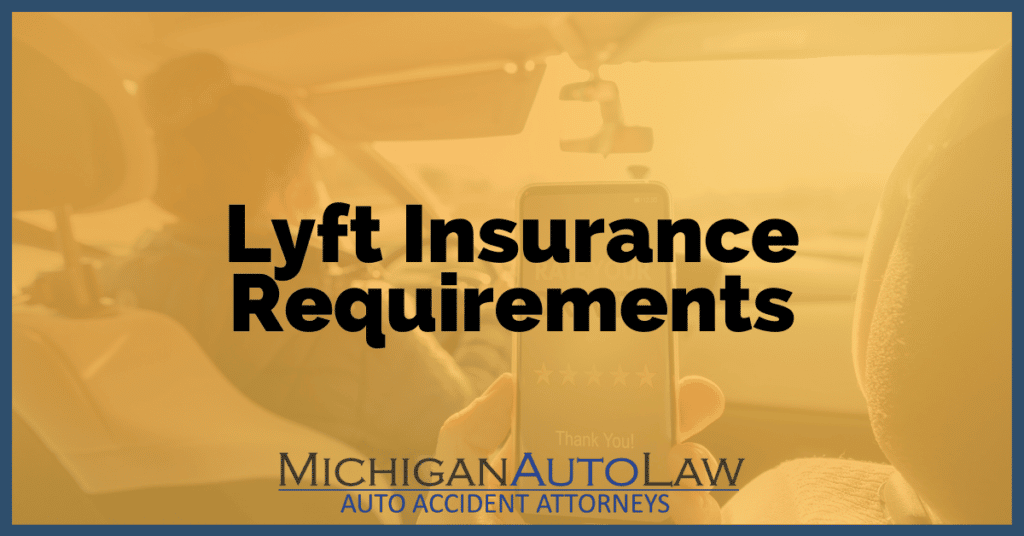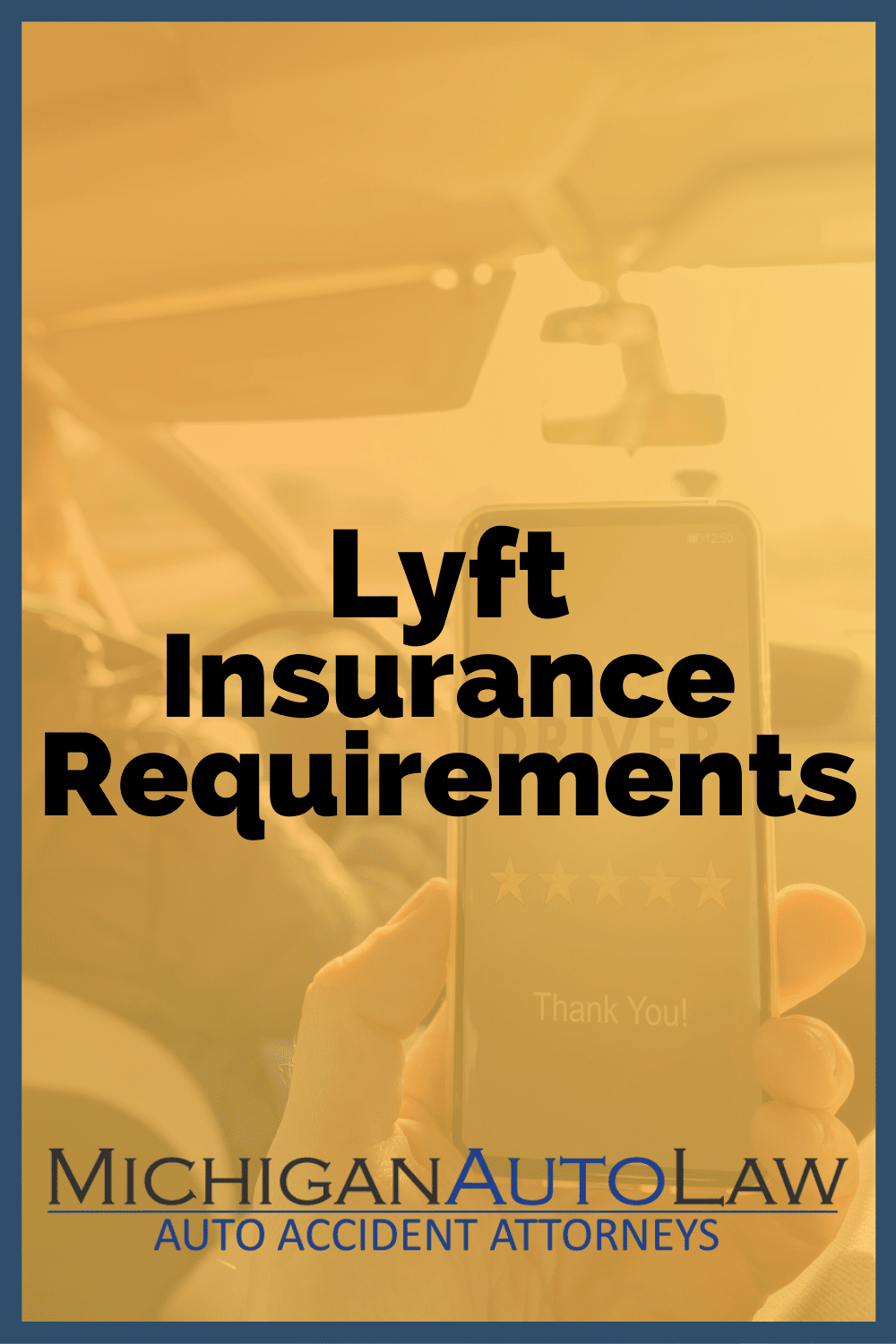Lyft Insurance Requirements For Michigan

Knowing the Lyft insurance requirements in Michigan is important whether you are a Lyft driver, Lyft passenger, driver or occupant of another vehicle that shares the road with a Lyft vehicle or whether you are a pedestrian or bicyclists. More people are using Lyft and, unfortunately, that means more Lyft crashes.
Liability coverage for drivers transporting passengers
The Lyft insurance requirements provide that rideshare drivers must have liability coverage “with a minimum combined single limit of $1,000,000.00 for all bodily injury or property damage” in place whenever they are transporting their passengers. (MCL 257.2123(3)(a); 257.518b(1)(b)(i))
Liability coverage for drivers without passengers
When rideshare drivers are “on-duty” but not transporting passengers, the Lyft insurance requirements provide that drivers must have liability coverage “in the amount of at least $50,000.00 per person for death or bodily injury” and “$100,000.00 per incident for death or bodily injury . . .” (MCL 257.2123(2)(a); 257.518b(1)(a)(i))
Lyft insurance requirements for No-Fault coverage
To comply with the conditions, Lyft drivers must have No-Fault PIP benefits coverage (also known as “personal protection” benefits) in place whether they are on-duty (without passengers) or whether they are transporting passengers. (MCL 257.2123(2)(b) and (3)(b); 257.518b(1)(a)(ii) and (b)(ii))
The amount of No-Fault PIP benefits coverage that will be available in the event of a Lyft accident will depend on the No-Fault PIP medical benefits coverage level selected in the Lyft driver’s auto policy. (MCL 500.3107c(5))
Rules for property damage
In addition to liability coverage and No-Fault PIP coverage, the law provides that rideshare drivers must carry “property protection” coverage. (MCL 257.2123(2)(b) and (3)(b); 257.518b(1)(a)(ii) and (b)(ii))
Who maintains the coverage to satisfy the Lyft insurance requirements in Michigan?
The conditions that apply to rideshare drivers when they are on-duty and/or transporting passengers “may be satisfied by automobile coverage maintained by” the Lyft driver, Lyft itself, “or a combination of both.” (MCL 257.2123(4))
What happens if there is a lapse in coverage?
The law provides that if a rideshare driver’s coverage lapses – or otherwise does not provide the legally required coverage – then the coverage maintained by Lyft “shall provide the coverage required . . . beginning with the first $1.00 of a claim” and Lyft’s “insurer shall defend the claim.” (MCL 257.2123(5))
Proof that the rules are met
The Lyft insurance requirements put the burden on both Lyft and their drivers to prove they have the necessary coverage:
- As a “transportation network company,” Lyft must provide proof to the Department of Licensing and Regulatory Affairs (LARA) that it has complied with the rules. (MCL 257.2104(5)(a))
- Lyft cannot allow a Lyft driver to transport passengers if the Lyft driver “does not possess proof of automobile liability coverage for each personal vehicle that he or she intends to use to provide transportation network company prearranged rides.” (MCL 257.2107(2)(f))
- Rideshare drivers must “carry proof” that they are in compliance with the rules “at all times during his or her use of a personal vehicle in connection with” being a rideshare driver. (MCL 257.2123(8))
- In the event that a Lyft driver is involved in an accident, then he or she shall provide “upon request to directly interested parties, automobile insurers, and investigating law enforcement officers” proof of coverage in compliance with the rules and whether he or she was on-duty as an Lyft driver or transporting Lyft passengers at the time of the accident. (MCL 257.2123(8)
Lyft insurance requirements determine which policy is primary
A Lyft driver or Lyft on the driver’s behalf “shall maintain primary automobile coverage on a personal vehicle” used to drive for Lyft that “recognizes” that the Lyft driver “uses the vehicle” as a Lyft driver “and covers” the Lyft driver “while he or she” is on-duty for Lyft or “while he or she is engaged in” transporting an Lyft passenger. (MCL 257.2123(1))
Auto insurance coverage provided by a policy maintained by Lyft “shall not be dependent upon [the Lyft driver’s] personal automobile insurer denying the claim first and shall not require [the Lyft driver’s] personal automobile insurer to deny the claim first.” (MCL 257.2123(6))
Need help after a Lyft accident? Call the attorneys at Michigan Auto Law
Call toll free anytime 24/7 at (800) 968-1001 for a free consultation with one of our experienced attorneys if you were injured in a Lyft accident. Michigan Auto Law attorneys have spoken at national seminars and legal conferences, teaching injury lawyers across the country about the Lyft insurance requirements and how to better handle Lyft car accident cases and better protect our clients. You can also get help from an experienced accident attorney by visiting our contact page or you can use the chat feature on our website.






